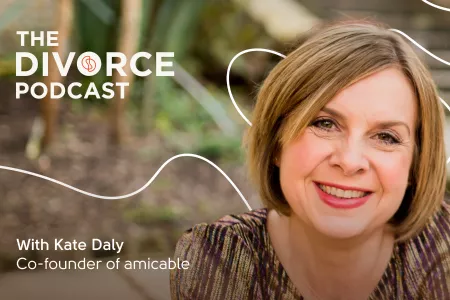How to get a divorce - step-by-step
There are three legal stages of divorce. There’s also an optional (but recommended) step in the middle of the divorce process, to end your financial marriage too (we’ll explain more about this later). The process is the same for civil partners, so all references to divorce apply equally to dissolving a civil partnership.
- Divorce application
- Conditional order
- Financial remedy order (a consent order if you agree) optional
- Final order
Step 1: Apply for your divorce
Choose whether you wish to make a sole application or a joint application. This is up to personal preference. If you make a joint application, it is possible to change to a sole application later in the process if needed.
Things you will need before you apply for a divorce:
You will need…
- To have been married for at least a year
- A copy of your marriage certificate
- A post address for your ex-partner
The ‘reflection period’ begins after your divorce has been started (issued) by the court. This is a mandatory 20-week period before your divorce can progress. You can read more about this in our checklist for the reflection period.
Step 2: Apply for your conditional order
If you’ve applied for divorce together, in a joint application, you will need to both check and approve the applications at each stage. If you apply in a sole application, your ex will need to respond before you can apply for your conditional order.
If you’re the ‘respondent’
You will need to ‘acknowledge receipt’ of the divorce application, and respond online, or by paper form posted back to court.
There are very few ways to contest a divorce with the introduction of no-fault divorce in April 2022. These are:
- The marriage was not legal
- You're already divorced
- Jurisdiction (you think the divorce should take place elsewhere)
Points of confusion
If you and your ex are amicable, don’t panic if you see on the divorce application that your ex has ticked the box to issue a financial order. This probably means that they would like to sort out your money, property and other finances through a consent order. Nothing needs to be immediately decided and you can always book a free 15-minute call to speak with us if you have any questions about the process.
If you’re the ‘applicant’
If you’re the applicant and your ex has responded or you applied for divorce together, you will be prompted for when you can apply for your conditional order by email, if you applied online or by post if you applied on paper.
You will need to complete the online form and tick the statement of truth in order to apply for your conditional order. If you’re applying by paper, you will need to fill out the form and return the paperwork, plus any other necessary documents to the court.
You can find more information about applying for your conditional order in our guide here.
Step 3: Apply for a consent order (optional)
If you want to end your financial marriage, you’ll need a clean break in a financial remedy order. This is called a consent order if you agree. This will need to be prepared (drafted) by a legal professional, such as amicable, and will also need to be reviewed by a judge to make sure it’s fair in the eyes of the law.
Even if you don’t have any money or property to sort out when you separate, you will stay financially tied together after your divorce, which means if you build up any pensions, or savings or receive any inheritance in the future, you're not protected against claims from your ex. If you have no assets, we offer an Automated Consent Order Service.
If you want to end your financial marriage through a consent order, it’s recommended you do this before the final order, especially if you are planning to share pensions as part of your settlement. However, if you’re already divorced, you can still apply for a consent order. If you have any questions about this, you can book a free 15-minute call with one of our amicable experts.
Step 4: Apply for your final order
Six weeks and one day after your conditional order date, you can apply for your final order, the last of the divorce stages.
Your conditional order date will be emailed to you if you apply online.
If you’re sorting out money and property as part of your divorce, it's normally recommended to wait until the financial matters have been resolved because your legal rights and responsibilities will change after you’re divorced.
You can read the full government advice on how your legal rights and responsibilities change after divorce here, but the key things that are affected gave to do with pensions and wills, particularly if you're sharing any pensions as part of your agreement.
You can find more information about applying for your final order in our guide here.
Points of confusion
The final order application is very quick and involves clicking the button under ‘latest updates’ prompting you to apply. Once you’ve submitted your application, it can be processed anywhere between an hour and a few days. So make sure you are confident you want to finalise your divorce. Once your application has been submitted and processed by the court, you’re officially divorced and free to re-marry.
FAQs
How do you define divorce?
Divorce is the legal, emotional and financial separation of two people who are married.
Can you divorce online?
Yes, you can apply for a divorce online through the government website. It is possible to print and post your divorce application to the court, however, this can take longer than the online process.
How long does it take to get a divorce online?
It takes a minimum of seven months for a divorce or dissolution to be finalised through the courts in England and Wales. It will take longer if you’re resolving your finances as part of your divorce.
How to apply for a divorce online?
You can apply for a divorce online through the government divorce portal or using an online divorce service such as amicable.
Read More

A consent order is a legally binding document, that formalises the financial arrangements you and your ex have agreed to.
%20(1).webp)
Divorce is commonly accepted now as one of the most traumatic experiences you may have in life. I know it certainly was for me.

Co-founder of amicable, Kate Daly is hosts 'The Divorce Podcast'. The Divorce Podcast explores all aspects of ending relationships, separation and parenting apart.

Start your amicable divorce journey
Speak to an amicable Divorce Specialist to understand your options and next steps for untying the knot, amicably.
Your guide to a kinder divorce
What if divorce didn’t have to be a battle?
In amicable divorce, Kate Daly offers compassionate, practical guidance to help you separate in a kinder, better way. Whether you’re just beginning, working through the practicalities or adjusting to co-parenting, this book meets you exactly where you are - and helps you move forward with confidence.
Pre-order on Amazon today






Comments (9)
I’m just at the beginning of the process. Partner not in agreement
I'd like to get some advice on how to calculate how much i would be entitiled to from the sale of our house. We are still living in the house together until sold, and we are amicable and hope to be able to get through this without falling out about finances. I we own it 50/50 and have always paid everything 50/50. but as I will be having to house 2 kids - a 16 year old (in sixth form) and a 19 year old (working) I would like to know what is a fair and usual amount for me to come away with? 60% or 70% of the equity? AND would I be expected to pay back that extra amount once both kids have left home? If I get more equity from the family house sale, will I still be entitled to maintenance payments for my son whilst he is in education and how much is that likely to be? We run a property business together and own 3 properties jointly which we rent out as serviced accommodation, and we also Rent2Rent 2 others as Serviced accommodation. and we need to keep these going to provide our joint incomes. Husband also owns a property in his own name which is rented on an AST but he is looking to sell this to help him finance a new home especially if he ends up with less than 50% of the family home. He also owns another property with 2 friends that they rent on and AST but not looking to sell that. Im not really looking to make anything on the property he owns in his own name or the one he has with friends, Im more concerned about our home and how much i will get out of that so that I can calculate how much i can afford to buy something new for? Can you help or advise please? Many thanks Liz
It's common that you and your ex-partner might be in different places mentally and emotionally at the beginning of the divorce process. We have several helpful blogs with some tips on how to break the news that you want a divorce from your partner. For more support, please book a free 15-minute consultation with one of our Divorce Specialists.
Hi Liz, we have several blogs and episodes of The Divorce Podcast that explain various aspects of asset division after divorce. However, to get more personalised advice, please book a free 15-minute call with one of our Divorce Specialists.
Thanks
Me & my wife are separated for last year or more. However we have a house ( joint ownership ) and 2 kids ( 5 years old twins ) and she lives in the house and i live seperately at my few friends place. we have mutually agreed to Divorce however we will not sell the house now so she and kids can stay until the boys are 16 or so. Kindly advise the process to move forward with Divorce application and what are the costs involved. Thank you so much and you can contact me on 07940224992.
Hi Deepak, thank you for getting in touch with amicable. There are several options like buyout (https://amicable.io/buying-out-a-partner-in-a-divorce) or a Mesher Order (https://amicable.io/what-is-a-mesher-order) that might work. We can help you weigh up your options and figure out the practicalities when it comes to dividing your money and property, please book a free 15-minute consultation with one of our Diorce Specialists here - https://calendly.com/d/crj-93m-rp4
Hi there, I'm thinking my marriage has come to the end of the road. We have now started to drift more and more apart. My wife also now of the opinion that she can have have some hollywood style divorce and take everything I have. What are my rights in this? Thanks
Hi Lee, thank you for reaching out and sharing what you’re going through. It’s normal to feel overwhelmed when separation becomes a real possibility, especially when there are worries about being treated fairly. But the reality in England and Wales is that dividing finances is based on a sense of balance and what’s reasonable. The legal starting point is usually a 50/50 split of assets, but this can shift depending on things like children’s needs (if the couple has any), each person’s financial situation, housing arrangements, and whether there’s been any agreement or contributions made during the marriage. At amicable, we support people to work through these issues amicably, and always with a focus on fairness and what works long-term. If you’re unsure what your rights or options are, we’d really recommend booking a [free 15-minute call](https://amicable.io/book-divorce-advice-call) with one of our Divorce Specialists. They’ll walk you through what’s possible based on your situation. It’s absolutely possible to move forward in a way that’s respectful, balanced, and doesn’t cost you everything (financially or emotionally).